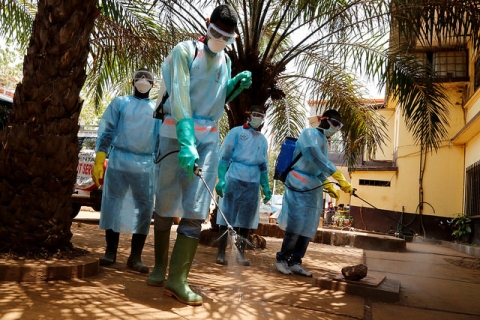
“Hala Nigeria,” a program of ICFJ’s Knight International Journalism Fellowships, is helping Nigerian journalists do a better job of tracking the deadly Ebola virus. As a Knight Innovation Fellow in Nigeria, I am helping Vivienne Irikefe of Television Continental (TVC) to show how the virus is spreading across West Africa.
Irikefe won the story contest as part of the Hala Nigeria program (which means “Speak out, Nigeria” in pidgin English). The program is designed to spur better coverage of vital health issues and increase audience engagement in those stories. Irikefe is tracking what the Nigerian government is doing to ensure the pandemic does not re-enter the country, including using SMS surveys to find out what is happening in the country’s borders and at its airports.
Ebola hemorrhagic fever is taking a huge toll on the West Africa sub-region with 15,935 cases and 5,689 deaths as of Nov. 26, 2014. The most affected countries are Sierra Leone, Liberia and Guinea, with Nigeria, Mali, the United States and Senegal among the countries also recording victims. Ebola has four of the strains that cause acute sickness in humans and animals. It is noted that the first human outbreaks occurred in 1976 in Zaire and present South Sudan.
Ebola virus is not transmitted through the air, thus increasing the chances to stem its control. When a person comes in contact with body fluids from an infected person or contaminated objects from infected persons, there is a high probability of infection. It is stated that the most likely natural hosts are fruit bats.
Via Ebola Facts, symptoms of the infectious virus include: general body weakness, high fever, diarrhea, vomiting and stomach pain. When the illness becomes acute, victims might show symptoms of rash, red eyes, chest pain, throat soreness, difficulty breathing or swallowing and bleeding.
Typically, symptoms appear 8-10 days after exposure to the virus, but the incubation period can span up to 21 days. Unprotected caregivers (family and clinics) are most susceptible to infection.
The World Health Organization states that, “there is no specific treatment or vaccine,” and the fatality rate can be up to 90 percent in some places. Patients are given supportive care, which includes providing fluids. Victims that report early and have good immune systems have good chances of survival.
Oluseun Onigbinde is a Knight International Journalism Fellow. This post originally appeared on his personal blog, Fitila. A slightly edited version is posted on ICFJ with permission from the author.
CC-licensed image courtesy of Flickr user European Commission DG ECHO.